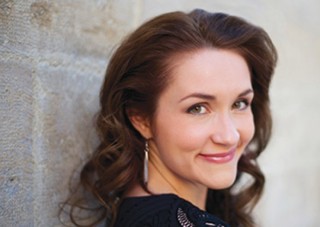Column Name
Title
Morley Gives Tully Recital

Body
Soprano Erin Morley (MM '05, voice, Artist Diploma '07, opera studies) brings a diverse lineup of art songs to this year's prestigious Alice Tully Vocal Arts Recital. Morley, a graduate of the Metropolitan Opera's Lindemann Young Artist Program, has sung more than 70 performances at the Met; her recital program includes songs by Poulenc and Richard Strauss, two composers in whose operas she's recently sung there.
The recital opens with Schubert's Delphine, the first line of which is, fittingly, “Ach was sol lich beginnen vor Liebe?” (“Oh, how shall I begin, for love?”). In 2009, Morley won third place with the song in London's Wigmore Hall International Song Competition. Rounding out the German offerings are songs by Brahms, Grieg, Mozart, Schumann, and Hugo Wolf. Adding spice: two love songs by Spanish composers Joaquín Rodrigo (“¿De dónde venís, amore?”) and Enrique Granados (“El mirar de la maja”). The bill also includes a Czech song by Dvorak, and two in Russian by Rachmaninoff and Tchaikovsky. There are also English pieces by Samuel Barber, John Musto, and R. B. Woodward.
Accompanying her will be Ken Noda (Pre-College '78; BM '82, piano), who is on the Lindemann coaching staff. In April, Morley returns to the role of Sophie in the Met's new production of Der Rosenkavalier and in June she'll sing Zerbinetta in Glyndebourne's Ariadne auf Naxos.
—Joshua Simka (BM '14, voice) is the assistant editor of The Journal.
Photo: Carlo Allemano
Lunch and Learns Inspire

As a freshman, I wasn't sure what to expect from the first Lunch and Learn of the school year. These periodic talks with acclaimed virtuosos are sponsored by the Alan D. Marks Center for Career Services and Entrepreneurship—often with other departments—and in the days beforehand, posters filled the hallways promoting the presentation of Grammy winner Eric Whitacre (MM '97, composition). The September 21 event, which was co-sponsored by Juilliard Open Ed, had been scheduled for the common hour, the one class-free span during the week. I arrived to find the luscious smell of hot pizza filling the Student Multipurpose Room, though the pizzas were entirely gone a few minutes into the program. We stood in the packed room listening in awe to one of our own talk about the emergence and expansion of his Virtual Choir—Whitacre asks singers to upload videos of themselves performing to YouTube, which are then synchronized for a single performance. It has become a global phenomenon and a testament to the possibility of using modern technology in the pursuit of new ideas.
It was so interesting that I came back a week later for the second Lunch and Learn. This one, which was co-sponsored by the Kovner Fellowship, was with Klaus Heymann, who founded Naxos Records in 1987 with the goal of selling inexpensive classical CDs. As Heymann told a fascinated Morse Hall audience, after initially acquiring recordings from a German company, he soon realized it would also be enticing to promote artists and orchestras more directly. In the ensuing decades, Naxos became not only the world's largest independent classical label, but also a pathway for seasoned but undiscovered artists.
This month's Career Services events include a discussion with faculty member William Baker, president emeritus of WNET (November 2); a roundtable with President Polisi on politics and the performing arts industry (November 2); a discussion with choreographer Danny Lucien Reid on community dance projects (November 9); and a program on public speaking with Barrett Hipes, the director of the Marks Center (November 16). The Whitacre Lunch and Learn was also the launch of Juilliard Open Ed's new discussion series called Tech Talks, more of which will be held in the new year.—First-year pianist Ruobing Zhang holds Juilliard and Susan Rose Piano scholarships.
Pictured: Naxos founder Klaus Heymann shown with Benjamin Sosland [MM '03, DMA '08, voice], the assistant dean for the Kovner Fellowships and administrative director of Juilliard Historical Performance. Photo: Jonathan Tichler
Election Panel Civility
On October 9, I sat in in the Juilliard computer lab and watched a presidential town hall debate more vitriolic and scurrilous than I had ever before imagined, much less seen. In stark counterpoint, the next day I had the great honor of participating in an illuminative discussion of same candidates' stances on the issues in a student panel moderated by President Joseph W. Polisi—a Juilliard tradition each election year which, like everything else in the 2016 campaign, was anything but traditional.
Owing to the divisiveness of the election this year, the panelists chose to represent issues rather than candidates, eschewing the typical debate-like format for a round-table discussion of both major candidates' stances on policy. My issue was immigration—a wonderful opportunity for me to become more familiar with an issue less frequently discussed back home in Wisconsin. As I researched, I quickly became cognizant of how infrequently the topic had been discussed by even the candidates themselves, who didn't mention their policies in either of the first two debates. The format was informal, and I felt that instead of an assortment of students, faculty, and staff, we became just a circle of concerned citizens.
In the end, the panel turned out to be a highlight of my semester. I learned something new from every one of my colleagues (Dan Kurland on foreign policy, Philip Sheegog on the economy, and Khady Gueye the rights of women and minorities). Members of the audience thoughtfully brought up issues like climate change and religious liberty. I think Polisi expressed it best when he closed the event with the wistful hope that the current presidential campaign rhetoric would more closely mirror the civility and rationality of our discussion that night in Morse Hall. If only.—Second-year master's composer Zachary Green (BM '15) holds Mary Rodgers Guettel and Bernard Jaffe scholarships as well as an Irene Diamond Graduate Fellowship.




